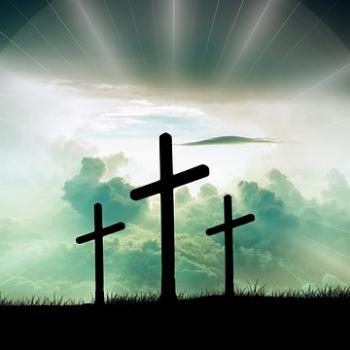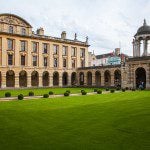Lectionary Reflections: Year A
Trinity Sunday (First Sunday after Pentecost)
June 19, 2011
Genesis 1:1-2:4a
We are about to enter that very long time in the church's year, rather blandly called "ordinary time." I first knew it as "Kingdomtide," but that name seems to fallen out of favor. For me, it is the time of the Christian year when a preacher can focus attention on some continuous texts from one major book of the Hebrew Bible. Year A brings us the vast riches of Genesis.
Trinity Sunday, the first Sunday after Pentecost, offers to us Genesis 1 in Year A. Its partner texts provide Psalm 8 and its reference to our human creation as "little lower than Elohim," which could be translated either "gods" or "God" or traditionally "angels," though there is little support in the language for the latter reading. The New Testament readings are Matthew 28:16-20 and 2 Corinthians 13:11-13 with their straightforward appeals to "Father, Son, and Holy Spirit." Hence, I assume the lectionary collectors heard some Trinitarian echoes in Psalm 8, though I admit for me the echoes are faint.
And I further assume that those intrepid lectionary compilers chose Genesis 1 because of the mysterious plurals in the mouth of God in verses 26-28. The earliest Christian commentators on that passage very quickly imagined that God was in fact having a chat with the other two persons of the Trinity when God decided to create you and me. There is in fact nothing especially wrong about such a claim, given that the Christian scriptural lenses tended to discern Jesus and the Spirit lurking under every rock and tree of the older testament.
However, I suggest that the author or authors of Genesis 1 did not have the Trinity in mind when they composed this grand poem. They had far larger fish to fry than that. Genesis 1 is nothing less than the curtain raiser for the entire biblical story, and I do not only mean the first act of the Hebrew Bible. "In the beginning, God . . ." quite literally grounds all of the Bible's story in the divine life and creativity of the one God.
Furthermore, the nature of this God is portrayed in sweeping wonder as one after another, the things and creatures that make up the grand cosmos pour forth from the power of the divine mouth. Merely with the sound of God's voice the world as we know it is revealed in its splendor. The ancient stories of the Near East speak regularly of brutal combat between rival gods as antecedents of the world's creation. There is no combat here in Genesis, rather the divine word alone that bids the world appear.
And what a world! Earth and sky, water and land, sun and moon, plants with visible seeds and plants with seeds hidden, wild animals and domesticated ones, and finally we humans comprise the panoply of the world of God's imagination. And it is all wondrously good (1:31)! At the end of 2:4a we see a world balanced and ordered and structured and designed, and behind all that stands the God who made it all.
But, of course, there is a certain wistful fear that intrudes on all who read this magnificent account of creation. Would that the world in which we find ourselves were like that! Would that our world were balanced and ordered, structured and designed for all its people and creatures. But when two billion of our brothers and sisters live on $2 a day and less, we know that the world that came from the mouth of the creator is not the world in which we live.
Hence, Genesis 1 is a model, it is hope, it is what we wish for and strive for. The rest of the Bible will be a long struggle to get the world back to the shalom of Genesis 1. It is hardly an accident that the last book in our Christian Bible, John's Revelation, in fact lands us back in Genesis 1. Revelation 21-22 describes a city that bears a striking resemblance to the world of Genesis 1, a place without need of sun or moon (those fourth-day creations of God) and with trees for healing (rather than those trees of danger and death of Genesis 3). And in that great city all will be together, even the terrible kings whose greed and power led to the fall of their civilization of evil (see Rev. 17-18), even they will now bring their goods into the city. And the gates are never shut and night is banished forever.
That wonderful social gospel hymn, by Walter Russell Bowie, "O Holy City, Seen of John," well captures the hope of Genesis 1 and of John's Revelation. His verse five reads, "Already in the mind of God that city riseth fair: lo, how its splendor challenges the souls that greatly dare; yea, bids us seize the whole of life and build its glory there." When we keep our eyes on the creation of God and on the holy city of God, a city that is always coming down out of heaven (the proper reading of the verb in Rev. 21:2), we can indeed "seize the whole of life and (help God) build its glory."
Still, this is a text for Trinity Sunday, and I have already suggested that the poets of Genesis 1 did not have the Holy Trinity in mind when they sang verses 26-28. Well, what might they have had in mind? Let me allow some unusual thoughts of a long-ago rabbi suggest an interesting way to hear these verses.





